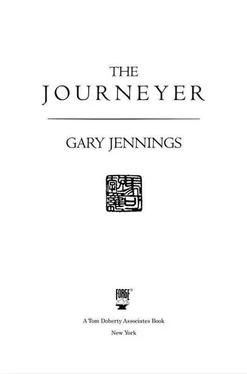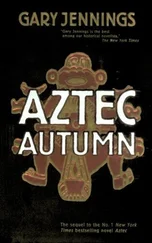Well, I was marched away, while the clerk and the warehouse men goggled. We had no great distance to go, but it seemed the longest of all the journeys I have ever made. I struggled feebly in the iron grip of the gastaldi and, more like a bimbo than a bravo, pleaded tearfully to know of what I was accused, but the stolid bailiffs never replied. As we tramped along the Riva, through crowds of passersby also goggling, my mind was a tumult of questions: Was there a reward? Who turned me in? Did Doris or Ubaldo somehow send word? We crossed over the Bridge of the Straw, but did not continue as far as the piazzetta entrance to the Doge’s Palace. At the Gate of the Wheat, we turned in to the Torresella, which stands adjacent to the palace and is the last remainder of what was in ancient times a fortified castle. It is now officially the State Prison of Venice, but its inmates have another name for it. The prison is called by the name our ancestors called the fiery pit before Christianity taught them to call it Hell. The prison is called Vulcano.
From the bright pink and amber morning outside, I found myself suddenly thrust into an orbà, which might not sound like much unless you know that it means “blinded.” An orbà is a cell just big enough to contain one man. It is a stone box, totally unfurnished and absolutely without any opening for light or air. I stood in a darkness unrelieved, suffocatingly close, foul with stench. The floor was thick with some gluey mess that sucked at my feet when I moved them, so I did not even try to sit down, and the walls were spongy with some slime that seemed to crawl when I touched it, so I did not even lean; when I tired of standing, I squatted. And I shook with an ague as I slowly comprehended the full horror of where I was and what had become of me. I, Marco Polo, son of the Ene Aca house of Polo, bearer of a name inscribed in the Libro d’Oro—so recently a free man, a carefree youth, free to wander where I would in the whole wide world—I was in prison, disgraced, despised, shut up in a box that no rat would willingly inhabit. Oh, how I wept!
I do not know how long I stayed in that blind cell. It was at least the remainder of that day, and it may have been two or three days, for, although I tried hard to control my fright-churned bowels, I several times contributed to the mess on the floor. When finally a guard came to let me out, I assumed I had been freed as innocent, and I exulted. Even had I been guilty of killing the Doge-elect, I was sure I had suffered punishment enough for it, and had felt enough remorse and sworn enough repentance. But of course my exultation was dashed when the guard told me that I had endured only the first and probably least of my punishments—that the orbà is only the temporary cell where a prisoner is held until time for his preliminary examination.
So I was brought before the tribunal called the Gentlemen of the Night. In an upstairs room of the Vulcano, I was stood in front of a long table behind which sat eight grave and elderly men in black gowns. I was not positioned too close to their table, and the guard on either side of me did not stand too close to me, for I must have smelled as terrible as I felt. If I also looked as terrible, I must have appeared the very portrait of a low and brutish criminal.
The Signori della Notte began by taking turns at asking me some innocuous questions: my name, my age, my residence, particulars of my family history and the like. Then one of them, referring to a paper before him, told me, “Many other questions must be asked before we can determine on a bill of indictment. But that interrogation will be postponed until you have been assigned a Brother of Justice to act as your advocate, for you have been denounced as the perpetrator of a crime which is capitally punishable … .”
Denounced! I was so stunned that I missed most of the man’s subsequent words. The denouncer had to be either Doris or Ubaldo, for only they knew that I had even been near the murdered man. But how could either of them have done it so quickly? And who did they get to write for them the denunciation to be slid into one of the snouts?
The gentleman concluded his speech by asking, “Have you any comment to make on these most serious charges?”
I cleared my throat and said hesitantly, “Who—who denounced me, Messere?” It was an inane thing to ask, since I could not reasonably expect an answer, but it was the question uppermost in my mind. And much to my surprise, the examiner did answer:
“You denounced yourself, young Messere.” I must have blinked at him stupidly, for he added, “Did you not write this?” and read from a piece of paper: “Will he be at both the Funeral and the Installation?” I am sure I blinked at him stupidly, for he added, “It is signed Marco Polo.”
Walking like a sleepwalker, I was taken by my guards down the stairs again, and then down another flight of stairs into what they called the wells, the deepest part of the Vulcano. Even that, they told me, was not the real dungeon of the prison; I could look forward, when I had been properly convicted, to being shifted into the Dark Gardens reserved for the keeping of condemned men until their execution. Laughing coarsely, they opened a thick but only knee-high wooden door in the stone wall, pushed me down and shoved me through it, and gave the door a slam like the knell of Doomsday.
This cell was at least considerably larger than the orbà and had at least a hole in the low door. The hole was too small to permit me to shake a fist through it at the departing jailers, but it did admit a trace of air and enough light to keep the cell from being utterly dark. When my eyes had adjusted to the murk, I could see that the cell was furnished with a lidded pail for a pissòta and two bare plank shelves for beds. I could see nothing else except what looked like a tumbled heap of bedclothes in one corner. However, when I approached it, the heap heaved and stood up and was a man.
“Salamelèch,” he said hoarsely. The greeting sounded foreign. I squinted at him and recognized the red-gray, fungoid hair and beard. It was the zudìo whose public scourging I had witnessed on a day memorable for much else.
10
“MORDECAI,” he introduced himself. “Mordecai Cartafilo.” And he asked the question that all prisoners ask each other at first meeting: “What are you in for?”
“Murder,” I said with a sniffle. “And I think treason and lesa-maestà and a few other things.”
“Murder will suffice,” he said drily. “Not to worry, lad. They will overlook those trifling other items. You cannot be punished for them once you have been punished for murder. That would be what is called double jeopardy, and that is forbidden by the law of the land.”
I gave him a sour look. “You are jesting, old man.”
He shrugged. “One lightens the dark as best one can.”
We sat gloomy in the gloom for a while. Then I said, “You are in here for usury, are you not?”
“I am not. I am in here because a certain lady accused me of usury.”
“That is a coincidence. I am also in here—at least indirectly—because of a lady.”
“Well, I only said lady to indicate the gender. She is really”—he spat on the floor—“a shèquesa kàrove.”
“I do not understand your foreign words.”
“A gentile putana cagna,” he said, as if still spitting. “She begged a loan from me and pledged some love letters as security. When she could not pay, and I would not return the letters, she made sure I would not deliver them to anyone else.”
I shook my head sympathetically. “Yours is a sad case, but mine is more ironic. My lady begged a service from me and pledged herself as reward. The deed was done, but not by me. Nevertheless, here I am, rather differently rewarded, but my lady probably does not even know of it yet. Is that not ironic?”
Читать дальше












